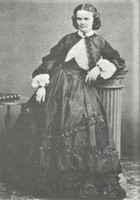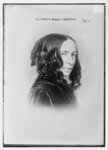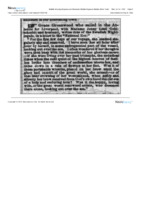"Masculine Women," Liberator, Jan 15, 1858
Dublin Core
Title
"Masculine Women," Liberator, Jan 15, 1858
Subject
Hosmer, Harriet Goodhue, 1830-1908
Gender Norms
Artists--Sculptors-- Italian
Social Critique
Ladies' Home Journal
Description
Mrs. Frances D. Gage criticizes an article in the Home Journal about the masculinity of women in jobs associated with men. She publishes her article in the Missouri Democrat, the article given here is a reprint, and takes Harriet Hosmer as her prime example to illustrate why the line of argumentation used by the Home Journal is wrong, she thereby emphasizes the femininity of Hosmer and praises her genius.
Credit
Creator
Gage, Frances D., 1863-1883
Publisher
William Lloyd Garrison and Isaac Knapp
Date
1858-01-15
Type
Reference
Article Item Type Metadata
Text
'MASCULINE WOMEN:'
Mrs. Frances D. Gage has a sensible and caustic criticism, in the last number of the Missouri Democrat, upon a remark in the Home Journal as to the triumphant claim to masculinitiy of genius made by Rose Bonheur and Harriet Hosmer.' She says: –
'Triumphant masculinity of Rosa Bonheur and Harriet Hosmer'! Was there ever cooler impudence than this? It is a belabored point with physiologist, spiritualist, philosopher, anatomist, lecturers, ministers and savans of nearly every grade and shape to meet out 'Utopian ideas' of equal rights by this argument. – By divine appointment, men and women are made to fill different spheres of life; that God's designs are immutable, and cannot be set aside. As proof, they state that every bone, nerve and muscle of woman's body is different from man's. We have just laid down a learned lecture from a very learned man – no less a personage than the Hon. Horace Mann – wherein he declares 'that from the crown of the head to the sole of the foot, there is not a ital organ in the tw, which, by its form, locality and function, would not reveal to the anatomist to which sex it belongs.'
Thus have the magnates settled the question, 'that woman was not to be man, or man woman': and this dread fact is thundered through the land, to the no small discomfiture of many a timid woman, who in her soul believes she has a right to use the talents God gave her for her own best good, yet dares not brave public scorn.
But when the womanly soul and womanly hand (for we are all woman, from the crown of our head to the sole of our foot) of Rosa Bonheur gives living, breathing pictures to the canvas, that draw all eyes and win all hearts, it is suddenly ascertained that all these former positve theories are mistakes. The lady – the gifted woman, Rosa Bonheur – can only 'lay claim to a triumphant masculinitiy of genius.'
Is it any more masculine to be able to paint the beauties of a horse, than to be able to see one, and admire it with womanly eyes?
Is it masculine to understand and to delineate one of the noblest of God's creatures? O, no! – only masculine to do it well: that's all.
Harriet Hosmer has not gone into masculine subjects, and given the impress of her mind to man or beast, with which to stamp her enduring fame upon the tablets of the centuries to come. But she has chosen the most womanly of all womanly subjects – lovely, loving, suffering woman. Go to our own beautiful library, and see the first great work of her hand – the stature of OEnone. In every touch of her chisel, she has delineated the woman; ah! from the crown of her head to the sole of her foot. It is woman – tender, affectionate, sensitive woman. Even more than that – woman weeping, postrate, subdued, with love and sorrow for man, and he a faithless one, a deserter, one who had broken his vows, and given to another what should have been hers alone. Had the gifted artist striven to do so, she could not have brought out a more striking ideal of womanly love, faithfulness and forgiveness. It is so beautiful and true, that it moves even the strong stern heart with gentler sympathies, and, if such thing can be, effeminises man. We visited the library a few mornings since, with an Ohio friend, a lawyer of the graver sort, who seldom indulges in sentiment, and is quite unused to the melting mood. His lip curled in scorn, as he saw that abortive masculine attempt to place a marble face and form of a Webster before us. 'What a burlesque on greatness!' he eclaimed. He walked on to the beautiful work of Miss Hosmer; suddenly his whispers ceased, and I saw him turn and wipe the tear of deep and thrilled emotion from his cheek. He gazed long and silently, and as we passed away, he breathed out the one word, 'beautiful!'
Was it some masculine thought glowing out in the marble that pressed that tear of feeling up from its deep slumbering fountain, and thus stirred the heart to holiness and truth? No, it was the exact opposite. What masculine triumph of genius, then, will Hosmer claim? Or, to use the exact words of the kid-gloved, rose-scented poet, author of the 'Lines to a Lady in a Chemisette with black buttons,' the triumphant claim to masculinity of genius made by this gifted woman is no where to be found, except in the fact that she has excelled even man himself.
Jean Paul Richter has said, 'It is the rising of the wild duck, and not her cry, that causes the flock to follow;' and we glory in the uprising of the inborn genius of these noble women – in the genius of Lydia Martin Spencer – the heroism of Mrs. Patten, who guided her ship through perilous seas - and the fearless Harriot Hunt and Elizabeth Blackwell, who dare, as physicians, to 'go about doing good.' Each and every one will, by her earnedt work, make the way smoother for another to follow, and honor and respect should reward the girl who, true to herself and her convictions of right, dares find her place behin the counter, in a daguerrean gallery, a jeweller shop, or printing office, or any other position, (right within itself,) where she may take refuge from a life of idle dependence upon the energies of others. Such are not masculine, but true wmen, so long as they abide in virtue and right, and live out life's highest and holiest principle – self-reliance – making of the talents God has given them other talenty, according to their own needs and capacities.
The mad-dog cry of masculinity has well-nigh spent its force. The world will recognize talent and power; and the wise ones are fast coming to the conclusion, that 'it will not pay' to let one half the genius and worth of a holy humanity lie undeveloped and unemployed, because the possessors, by an accident of birth, are women.
The world will admire the statues of Miss Hosmer, the paintings of Lydia Spencer and Rosa Bonheur, the oratory of Lucy Stone, the song of Jenny Lind, the authorship of Harriet B. Stowe, the tales of Currer Ball, and the poems of E. Barrett Browning, the learning of Miss Peabody, and the astronomy of Mrs. Somerville. Women of rare endowments are now no longer rare, and the young men of our age must bestir their masculine faculties, and keep in advance of these, or they will indeed be held as the husbands of the Mrs. Smiths; or they must follow the lecturer's advice, and never marry a strong-minded woman – which according to Webster and Worcester, mean 'a woman of vigorous mind.'
And we do hope to live to see the day when a soft-pated man will not be called an old granny or a Miss Nancy, or a woman of genius and power 'masculine.'
F.D.G. [Frances D. Gage]
North St. Louis, Dec. 21.
Mrs. Frances D. Gage has a sensible and caustic criticism, in the last number of the Missouri Democrat, upon a remark in the Home Journal as to the triumphant claim to masculinitiy of genius made by Rose Bonheur and Harriet Hosmer.' She says: –
'Triumphant masculinity of Rosa Bonheur and Harriet Hosmer'! Was there ever cooler impudence than this? It is a belabored point with physiologist, spiritualist, philosopher, anatomist, lecturers, ministers and savans of nearly every grade and shape to meet out 'Utopian ideas' of equal rights by this argument. – By divine appointment, men and women are made to fill different spheres of life; that God's designs are immutable, and cannot be set aside. As proof, they state that every bone, nerve and muscle of woman's body is different from man's. We have just laid down a learned lecture from a very learned man – no less a personage than the Hon. Horace Mann – wherein he declares 'that from the crown of the head to the sole of the foot, there is not a ital organ in the tw, which, by its form, locality and function, would not reveal to the anatomist to which sex it belongs.'
Thus have the magnates settled the question, 'that woman was not to be man, or man woman': and this dread fact is thundered through the land, to the no small discomfiture of many a timid woman, who in her soul believes she has a right to use the talents God gave her for her own best good, yet dares not brave public scorn.
But when the womanly soul and womanly hand (for we are all woman, from the crown of our head to the sole of our foot) of Rosa Bonheur gives living, breathing pictures to the canvas, that draw all eyes and win all hearts, it is suddenly ascertained that all these former positve theories are mistakes. The lady – the gifted woman, Rosa Bonheur – can only 'lay claim to a triumphant masculinitiy of genius.'
Is it any more masculine to be able to paint the beauties of a horse, than to be able to see one, and admire it with womanly eyes?
Is it masculine to understand and to delineate one of the noblest of God's creatures? O, no! – only masculine to do it well: that's all.
Harriet Hosmer has not gone into masculine subjects, and given the impress of her mind to man or beast, with which to stamp her enduring fame upon the tablets of the centuries to come. But she has chosen the most womanly of all womanly subjects – lovely, loving, suffering woman. Go to our own beautiful library, and see the first great work of her hand – the stature of OEnone. In every touch of her chisel, she has delineated the woman; ah! from the crown of her head to the sole of her foot. It is woman – tender, affectionate, sensitive woman. Even more than that – woman weeping, postrate, subdued, with love and sorrow for man, and he a faithless one, a deserter, one who had broken his vows, and given to another what should have been hers alone. Had the gifted artist striven to do so, she could not have brought out a more striking ideal of womanly love, faithfulness and forgiveness. It is so beautiful and true, that it moves even the strong stern heart with gentler sympathies, and, if such thing can be, effeminises man. We visited the library a few mornings since, with an Ohio friend, a lawyer of the graver sort, who seldom indulges in sentiment, and is quite unused to the melting mood. His lip curled in scorn, as he saw that abortive masculine attempt to place a marble face and form of a Webster before us. 'What a burlesque on greatness!' he eclaimed. He walked on to the beautiful work of Miss Hosmer; suddenly his whispers ceased, and I saw him turn and wipe the tear of deep and thrilled emotion from his cheek. He gazed long and silently, and as we passed away, he breathed out the one word, 'beautiful!'
Was it some masculine thought glowing out in the marble that pressed that tear of feeling up from its deep slumbering fountain, and thus stirred the heart to holiness and truth? No, it was the exact opposite. What masculine triumph of genius, then, will Hosmer claim? Or, to use the exact words of the kid-gloved, rose-scented poet, author of the 'Lines to a Lady in a Chemisette with black buttons,' the triumphant claim to masculinity of genius made by this gifted woman is no where to be found, except in the fact that she has excelled even man himself.
Jean Paul Richter has said, 'It is the rising of the wild duck, and not her cry, that causes the flock to follow;' and we glory in the uprising of the inborn genius of these noble women – in the genius of Lydia Martin Spencer – the heroism of Mrs. Patten, who guided her ship through perilous seas - and the fearless Harriot Hunt and Elizabeth Blackwell, who dare, as physicians, to 'go about doing good.' Each and every one will, by her earnedt work, make the way smoother for another to follow, and honor and respect should reward the girl who, true to herself and her convictions of right, dares find her place behin the counter, in a daguerrean gallery, a jeweller shop, or printing office, or any other position, (right within itself,) where she may take refuge from a life of idle dependence upon the energies of others. Such are not masculine, but true wmen, so long as they abide in virtue and right, and live out life's highest and holiest principle – self-reliance – making of the talents God has given them other talenty, according to their own needs and capacities.
The mad-dog cry of masculinity has well-nigh spent its force. The world will recognize talent and power; and the wise ones are fast coming to the conclusion, that 'it will not pay' to let one half the genius and worth of a holy humanity lie undeveloped and unemployed, because the possessors, by an accident of birth, are women.
The world will admire the statues of Miss Hosmer, the paintings of Lydia Spencer and Rosa Bonheur, the oratory of Lucy Stone, the song of Jenny Lind, the authorship of Harriet B. Stowe, the tales of Currer Ball, and the poems of E. Barrett Browning, the learning of Miss Peabody, and the astronomy of Mrs. Somerville. Women of rare endowments are now no longer rare, and the young men of our age must bestir their masculine faculties, and keep in advance of these, or they will indeed be held as the husbands of the Mrs. Smiths; or they must follow the lecturer's advice, and never marry a strong-minded woman – which according to Webster and Worcester, mean 'a woman of vigorous mind.'
And we do hope to live to see the day when a soft-pated man will not be called an old granny or a Miss Nancy, or a woman of genius and power 'masculine.'
F.D.G. [Frances D. Gage]
North St. Louis, Dec. 21.
Location
Boston, MA, US
Geocode (Latitude)
42.3602534
Geocode (Longitude)
-71.0582912
Social Bookmarking
Geolocation
Collection
Citation
Gage, Frances D., 1863-1883, “"Masculine Women," Liberator, Jan 15, 1858,” Archival Gossip Collection, accessed July 3, 2024, https://archivalgossip.com/collection/items/show/421.




